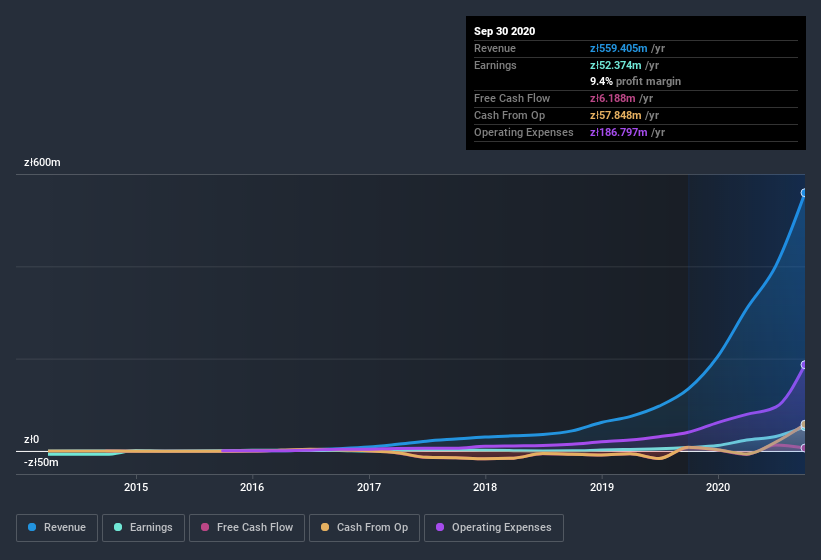
Statistically speaking, it is less risky to invest in profitable companies than in unprofitable ones. That said, the current statutory profit is not always a good guide to a company's underlying profitability. This article will consider whether Columbus Energy's (WSE:CLC) statutory profits are a good guide to its underlying earnings.
While Columbus Energy was able to generate revenue of zł559.4m in the last twelve months, we think its profit result of zł52.4m was more important. At the risk of seeming quaint, we do like to at least examine profit, even when a stock is improving revenue and considered a 'growth stock'. Happily, it has grown both its profit and revenue over the last three years, as you can see in the chart below.
See our latest analysis for Columbus Energy

Of course, it is only sensible to look beyond the statutory profits and question how well those numbers represent the sustainable earnings power of the business. So today we'll look at what Columbus Energy's cashflow tells us about the quality of its earnings. Note: we always recommend investors check balance sheet strength. Click here to be taken to our balance sheet analysis of Columbus Energy.
A Closer Look At Columbus Energy's Earnings
Many investors haven't heard of the accrual ratio from cashflow, but it is actually a useful measure of how well a company's profit is backed up by free cash flow (FCF) during a given period. To get the accrual ratio we first subtract FCF from profit for a period, and then divide that number by the average operating assets for the period. The ratio shows us how much a company's profit exceeds its FCF.
That means a negative accrual ratio is a good thing, because it shows that the company is bringing in more free cash flow than its profit would suggest. While it's not a problem to have a positive accrual ratio, indicating a certain level of non-cash profits, a high accrual ratio is arguably a bad thing, because it indicates paper profits are not matched by cash flow. To quote a 2014 paper by Lewellen and Resutek, "firms with higher accruals tend to be less profitable in the future".
Columbus Energy has an accrual ratio of 0.57 for the year to September 2020. Ergo, its free cash flow is significantly weaker than its profit. Statistically speaking, that's a real negative for future earnings. To wit, it produced free cash flow of zł6.2m during the period, falling well short of its reported profit of zł52.4m. Columbus Energy shareholders will no doubt be hoping that its free cash flow bounces back next year, since it was down over the last twelve months.
Our Take On Columbus Energy's Profit Performance
As we discussed above, we think Columbus Energy's earnings were not supported by free cash flow, which might concern some investors. As a result, we think it may well be the case that Columbus Energy's underlying earnings power is lower than its statutory profit. But the good news is that its EPS growth over the last three years has been very impressive. Of course, we've only just scratched the surface when it comes to analysing its earnings; one could also consider margins, forecast growth, and return on investment, among other factors. So while earnings quality is important, it's equally important to consider the risks facing Columbus Energy at this point in time. For example, we've found that Columbus Energy has 3 warning signs (1 is significant!) that deserve your attention before going any further with your analysis.
Today we've zoomed in on a single data point to better understand the nature of Columbus Energy's profit. But there are plenty of other ways to inform your opinion of a company. Some people consider a high return on equity to be a good sign of a quality business. While it might take a little research on your behalf, you may find this free collection of companies boasting high return on equity, or this list of stocks that insiders are buying to be useful.
If you decide to trade Columbus Energy, use the lowest-cost* platform that is rated #1 Overall by Barron’s, Interactive Brokers. Trade stocks, options, futures, forex, bonds and funds on 135 markets, all from a single integrated account. Promoted
New: AI Stock Screener & Alerts
Our new AI Stock Screener scans the market every day to uncover opportunities.
• Dividend Powerhouses (3%+ Yield)
• Undervalued Small Caps with Insider Buying
• High growth Tech and AI Companies
Or build your own from over 50 metrics.
This article by Simply Wall St is general in nature. It does not constitute a recommendation to buy or sell any stock, and does not take account of your objectives, or your financial situation. We aim to bring you long-term focused analysis driven by fundamental data. Note that our analysis may not factor in the latest price-sensitive company announcements or qualitative material. Simply Wall St has no position in any stocks mentioned.
*Interactive Brokers Rated Lowest Cost Broker by StockBrokers.com Annual Online Review 2020
Have feedback on this article? Concerned about the content? Get in touch with us directly. Alternatively, email editorial-team (at) simplywallst.com.
About WSE:CLC
Columbus Energy
Provides solar photovoltaics and heat pumps installation and maintenance services in Poland.
Low with imperfect balance sheet.
Similar Companies
Market Insights
Community Narratives




